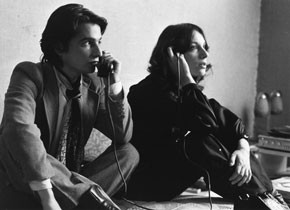Gérard Blain
Jean Eustache
Maurice Pialat
March 4 to April 4, 2016
In some respects the famous “New Wave” remains overvalued to this day, while the French post-nouvelle vague cinema persists in its shadow. The retrospective confronts this neglect with three outstanding figures. The films of Gérard Blain, Jean Eustache and Maurice Pialat are substantial examples of an intensification of European auteur cinema in the 1970s – examples of an almost painful sensibility, likewise discernible in the work of Chantal Akerman, Philippe Garrel, Werner Schroeter or Rainer Werner Fassbinder: a sensibility for the disappointments of youth, for the corporeal, and for the unsustainability of “delicate” sentiments.
Whereas Eustache and Pialat are two recognized figures of this transition, the directorial work of actor Gérard Blain is an international discovery. His work carries its own particular stamp while cultivating a close relationship to Eustache and Pialat’s esthetic credo: all three found individual ways of combining “documentary” clarity, emotional nakedness and a depth of human insight that can be perceived as an instinctive counter-reaction to the stylistic games and youthful savoir vivre of the previous generation. Critics such as Jonathan Rosenbaum have aptly declared Eustache’s most well-known film La Maman et la putain (1973) “the nail in the coffin of the New Wave”: in it, the subject of the urban, loquacious love triangle is pursued in an epic form endowed with overwhelming disillusionment, scraping the barrel until critical collapse is reached.
Gérard Blain (1930–2000) stumbled upon the world of film by accident after a difficult youth as a street urchin during the German occupation. His roles in Claude Chabrol’s first films granted him a short-lived international launch into stardom as a sort of “French James Dean.” However, the nonconformist rubbed everyone up the wrong way all his life – his film title Le Rebelle (1980) is no coincidence. From 1971 on, he focused on the role of director: his debut Les Amis, a candid and gently iridescent study of the relationship between a married man and a boy earned him much praise, as well as comparisons with his idol Robert Bresson, whose love for amateur actors and pared-down narratives Blain shared. François Truffaut deemed it a “revelation.” Even so, it failed to attract audiences and his following films were practically ignored despite being featured at festivals (Le Pélican in Berlin in 1974, and the autobiographical portrait of a childhood during the occupation Un enfant dans la foule in Cannes in 1976). Thus, Blain’s consistently captivating work, equal parts bright and merciless, strict and sensitive, awaits a major rediscovery.
Although the youngest of the three, Jean Eustache (1938–81) had become known by the mid-Sixties as a protégé of the nouvelle vague. In 1968, he took a decisive turn towards documentary filmmaking, with a free and unexpected approach: La Rosière de Pessac (1968) depicts “merely” the annual election of the most virtuous girl in his hometown, and the materialist masterpiece Le Cochon (1970) the slaughter and processing of a pig on a small French farm – but both open up entire worlds to us. Following on the heels of the global hit La Maman et la putain, his wonderful coming-of-age story Mes petites amoureuses (1974) turned out to be a box office flop, whereupon the brooding, depressive director turned to smaller-scale projects. But even in these later works, such as the enthralling docu-fiction diptych Une sale histoire (1977), he proved to be a genuine innovator. In 1981 Eustache committed suicide.
Just like Blain, Maurice Pialat (1925–2003) had a late start in his career as director, yet his feature debut L'Enfance nue (1968) was immediately hailed as the film of the new generation. Although its topic, childhood, seems beholden to a Truffautian sensibility, the unswerving gaze and existential approach as well as the insistence on pain already disclose the exceptional in Pialat's method. Just as in the case of Eustache and Blain, he was deemed difficult and “bleak”, but unlike the other two directors his series of remarkable films managed to lay a solid foundation for his filmmaking career, stretching far beyond the ’70s. Successes such as Passe ton bac d’abord (1978), Loulou (1980) and his triumph A nos amours (1983) saw Pialat become the survivor of a principally “lost” generation without having made even the smallest of compromises. “The possible and impossible in life is an open secret in Pialat's films, as open as a wound and the sea.” (Bert Rebhandl)
French society, however, closed the wounds of post-1968 uncertainty with a chain of compromises. From today's perspective, the cultural blossoming often attributed to the Mitterrand era from 1981 on resembles a newly emblazoned spectacle, pumped-up by public funds and accompanied by its own youth culture strand, the (advertising-derived) cinéma du look. The gap between mavericks like Pialat and a new populism in filmmaking grew rapidly. The fifteen “difficult” years preceding this turnaround, however, are fully preserved in the bruised cinema created by Blain, Eustache, and Pialat: portrait of an age of turmoil.
